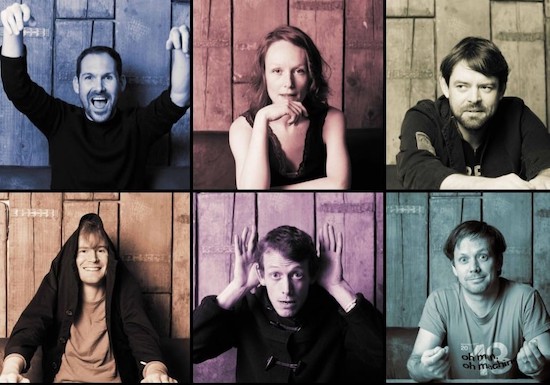I’ve often wanted to shoot Sea Power’s bloody polar bear. Over the past decade, at the climax to their gigs, the towering and mangy form of Ursine Ultra has come to wander around the audience. The assembled tended to gawp, film, and take selfies while paying no attention to what is happening onstage. NO! I’d internally shriek, This is NOT what it is all about! Sea Power are psychedelic rock visionaries, exploring wonder, death and longing! The bear unfortunately gave credence to the (erroneous) view that they’re a bunch of wacky indie geeks singing songs about ice shelves and birds for jolly japes. Instead, their great strength has been the more complex path of sharing the personal through external themes, rather than the queasy sincerity and trite emoting that has become the contemporary cultural norm. Everything Was Forever, their seventh non-soundtrack album, might silence the doubters, such is its sense of vigour and renewal. <a href=“https://www.theguardian.com/music/2021/aug/13/sea-power-why-we-dropped-british-from-our-name" target=“out”>This is of course most superficially noticeable in their change of name from British Sea Power, a move that captured the sort of harrumphing from the usual quarters that proved it was the right thing to do. It is evident too in the new fans the band have acquired via their BAFTA-winning soundtrack to computer game Disco Elysium. As the reinvigorated Sea Power now forge on, their name now impossible to misinterpret as it celebrates the universal and elemental, it’s the intensity of this record that carries them.
It strikes me that Sea Power’s finest work has come when they engage with themes of loss. An atmosphere of something slipping away was all over their debut album, which was after all called The Decline Of…. You could hear it in ‘Carrion”s “Brilliantine mortality” and, in ‘Blackout’, the sense of a fading England where “you have drunk all your beer now drown your empty selves”. (Booze is often a quasi-spiritual eau de vivre in Sea Power’s world). It was there in ‘Remember Me’, which was released on limited edition 7” records, each copy devoted to someone dearly departed. Absence and a feeling of a world gone awry was across their next classic, third album Do You Like Rock Music?, in which the group regretted our no-longer black nights (‘Lights Out For Darker Skies’), the east coast floods of 1953 (‘Canvey Island’) and, in ‘Waving Flags’ wrote a (boozy) pro-immigration anthem that now feels like a lament for a more progressive Britain that could have been. In all this, they’re a band who always seemed to straddle the past and present, not fustily, but instead timeless, universal. This unique worldview stems from brothers Hamilton and Jan Scott Wilkinson’s unusual upbringing in the Lake District, with parents who were from a distant generation – their father Ronald served in an anti-aircraft battery in the Second World War. Sea Power have always had a tough and determined edge that generally seems to be missing from more effete groups in the British art rock milieu, presumably what has kept them going through their 20 years of modest and sometimes decreasing success. They were council house kids raised in beautiful surroundings – though, <a href=“https://www.theguardian.com/music/2021/oct/19/sea-power-changed-name-british-album-nature-parents" target=“out”>as the band told me when I interviewed them for The Guardian), their experience of the tourist hotspot was more about poverty and boredom relieved by magic mushrooms and the liberating potential of music than whimsical pottering along beck and up fell with a tea-stained Beatrix Potter sketchbook. Over the past couple of years, the Wilkinson brothers lost both mum and dad, severing a link to time and place. As they told Paddy Clarke in tQ’s recent interview, a feeling of grief, remembrance, defiance and rebuilding sits across the album, both personal and reflecting on the difficult times we live in.
Everything Was Forever marks Sea Power’s first work with Graham Sutton as producer in over a decade, and it shows. The band are always in fulsome praise of the Bark Psychosis man’s ability to conjure out their best work and, as a listener, it’s clear he has an uncanny knack of trimming the fat that prevented the albums since Do You Like Rock Music?, decent though they were, from reaching their full potential. He and the band have worked wonders on a record shared between firecracking anthems and reflective moments, a refining of the established Sea Power palette. Abi Fry, Phil Sumner and drummer Woody lift the record not just through their by now trademark augmentation in brass, viola and sturdy rhythms, but the delicacy with which tracks slip in and out of view.
Though it’s not one of the most obvious songs on the album, ‘Lakeland Echo’ is the key that unlocks it. It starts with just a quiet vocal from Hamilton, seemingly echoing the voices of his late parents: "Turn the tape on / That’s a grand track / That’s a good one”. It builds and builds to hover in a beautifully poised moment, emotion that is no less tender for its restraint. The song becomes even more poignant when you watch the video that features footage of the Yan and Hamilton’s late parents intercut with shots of the area the family grew up in. At the end, their old man disappears into the distance over a rise in the road, raising his arms in triumph, as if in celebration of his sons. It’s incredibly touching. To think upon loss, to look to the past, to venerate our forebears, does not have to be nostalgia as the reductive, negative energy that holds so many (by ‘so many’ I mean ‘our nation’) back, but as reflective, emancipatory and, curiously, realistic. "It’s not for everyone," Hamilton sings, perhaps again channeling Ronald’s views on Sea Power’s music. That’s at the crux of things for me – "it’s not for everyone" doesn’t have to be an admission of failure, but a comfort that some precious things are going to be beloved by a devoted few.
The late Ronald and Margaret Wilkinson would no doubt be shouting “that’s a grand track! That’s a good one!” with enthusiasm throughout this record, for there’s not a duff moment. Among the highlights are the electronic, rainbow burbles of ‘Folly’, addressed to us all on “this weird rock” where “You’re losing the right to breathe / You’re losing the right to roam”. Then there’s the surging eulogy to the natural world ‘Green Goddess’, and guitarist Martin Noble fires into the tone zone in his soloing for the galumphing ‘Two Fingers’, a righteous and triumphant ‘fuck you’ to the state of things, but also an exhortation to take two fingers of booze in a toast for better times. Also key is just how both Wilkinson brothers are in their finest vocal form. ‘Fear Eats The Soul’ is a cinematic shimmer, Hamilton’s voice querulous and unsure, like an escapee from a Victorian asylum wandering a nocturnal woodland. ‘Doppelgänger’ is one of the greatest tracks the band have ever recorded, up there with early single ‘Spirit Of St Louis’ as an atmospheric rager that sounds like Bauhaus’ ‘In The Flat Field’ pissed, priapic and mounting Helvellyn. “LOOK AT ME, I”VE GOT A NEW FACE!” screams Yan; “INTO THE GRAVE! INTO THE GRAVE!” It’s utterly, gloriously bonkers, a trippy exorcism.
If I’ve sometimes been frustrated by the daft bear and how some of Sea Power’s albums have been so bloated they stop sitting with you after a while, it’s because I am at heart an evangelist who believes that the music I adore might change others too. I think as you age this becomes a harder feeling to hold on to, as experience calcifies and frustrations at the way things are become an ever-increasing burden. It’s nearly 20 years now since I saw Sea Power play a gig at the Ram Inn in the tiny Sussex village of Firle, their blistering odd rock melding with the spring-touched South Downs and pints of Harvey’s Best in utter euphoria. Back then, Sea Power’s aesthetic helped reshape the way I thought about how art and music might engage with landscape, nature, history. I have recently thought these transformative experiences might now be confined to the past, but really this album has a simple message – be more like Ronald and Margaret Wilkinson. The other morning, buffeted by the kind of New Year depression that always comes with the anti-cyclonic gloom of grey January and feels especially heavy as we enter the third year of the Covid pandemic, I took a desperate stomping walk around the local park. The skies had cleared, leaving a crisp white frost and, on the pond, a vortex of steam danced into the air above two gaudy and garrulous Egyptian geese. ‘Lakeland Echo’ was in my ears as my senses were overcome and I felt my entire body shake, my mind lift, tears rolling down my cold face. That music can do that throughput our lives is something to cherish, a reminder that loss doesn’t always mean things slipping away, that optimism might endure, as Hamilton sings at the end of ‘Folly’, “One morning you are going to wake up / In a different world”.



